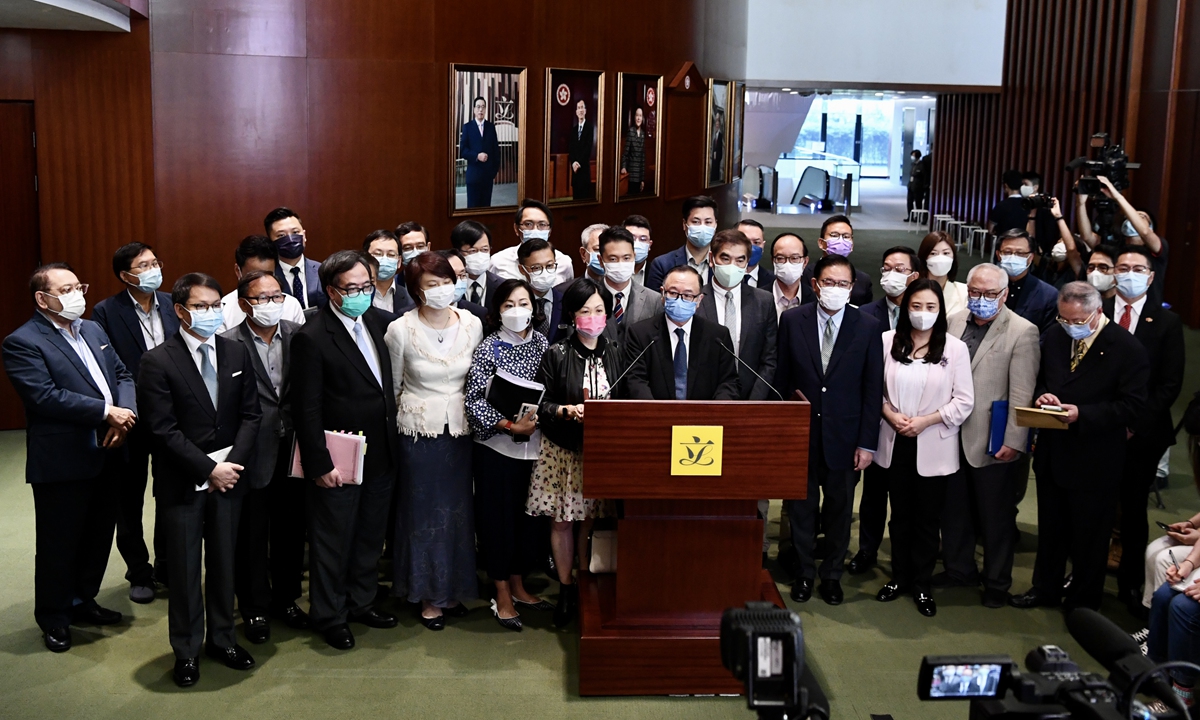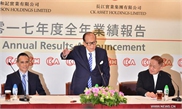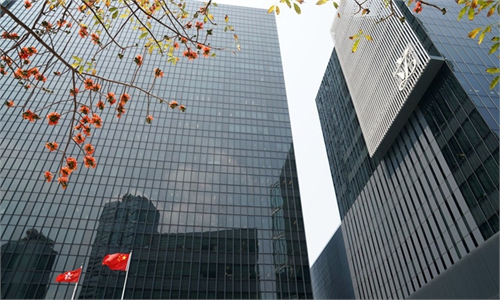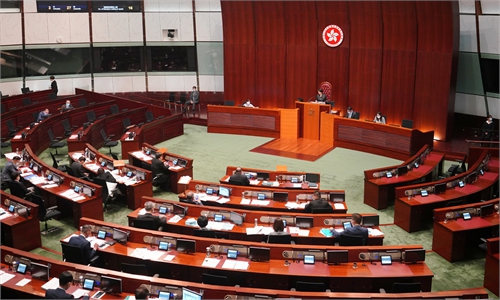Hong Kong finalizes local amendments for election overhaul
Huge changes in HK political environment with restored peace, deep-seated problems still need resolving

Hong Kong pro-establishment camp lawmakers hold a press conference at the Legislative Council on Thursday to answer media questions about the amendments of the city's electoral system. Photo: cnsphoto
With the Legislative Council (LegCo) completing a review of a number of amendments on Thursday as part of the improvement of the Hong Kong electoral system, Hong Kong is accelerating the process of ushering in a proper system of governance, which ensures only patriots running for public office, and shields the city from rioting, citywide rampages, endless filibustering tactics from the radical opposition and the risk of color revolutions.
During the voting process, 40 lawmakers voted for the amendment bill, two voted against it. After three readings of the bill, relevant regulations will be signed by the chief executive of the Hong Kong Special Administrative Region(HKSAR) government and published in the Government Gazette before taking effect.
It took less than two months for Hong Kong's legislative body to finalize the local law amendments, including the amendment of eight main body articles and 24 auxiliary articles, laying out the details for electing the HKSAR chief executive and the formation of the LegCo.
Officials from the central and HKSAR governments hailed the passage of the local law amendment as "historical" and a "milestone" moment, paving the way for commencing efficient and positive administration in the city.
Carrie Lam, chief executive of the HKSAR government, welcomed the passage of amendments to electoral laws, hailing it as a landmark occasion for ensuring "patriots administering Hong Kong" under the "one country, two systems."
Local law amendments to the Hong Kong electoral overhaul fully demonstrated the consensus of public opinion, embedded with the characteristics of democracy, openness and progress, the liaison office of the central government in Hong Kong said in a statement on Thursday. With the new electoral system having been formed, it's also believed to be fully implemented.
A spokesperson from the Hong Kong and Macao Affairs Office of the State Council said it also unveils a new chapter for good local governance in Hong Kong.
This was also the fastest local law amendment process in Hong Kong, because with virtually no radical opposition in the local legislature, no one appeared to challenge the will and determination of the central government in safeguarding the national security and constitutional order of Hong Kong under the national security law and through electoral reform in the city, observers said.
"It didn't just start from zero. The top legislature has already laid out the fundamentals for the overhaul. What the local legislative body has to do is localize them as soon as possible," Tang Fei, a member of the Chinese Association of Hong Kong and Macao Studies, told the Global Times .
The milestone reform in closing loopholes in the city's governance structure is widely considered another significant step following the enactment of the national security law for Hong Kong. This assists in restoring social order and rooting out the risks of color revolutions incited by external forces and their political proxies in Hong Kong, helping the city shake off endless political disputes and pressure from radical forces.
Some of the major changes involve the distribution of seats in LegCo, which now includes 40 seats from the Election Committee, 30 from functional constituencies and 20 which are directly elected, with the number of seats increasing from 70 to 90.
The current seats held by super district councillors have been scrapped, while newly added seats include HKSAR deputies to the National People's Congress (NPC) and HKSAR members of the National Committee of the Chinese People's Political Consultative Conference (CPPCC) - the top political advisory body - as well as representatives of Hong Kong members of relevant national organizations.
A new section of 300 members has been added to the Hong Kong Election Committee, taking the total number of seats from 1,200 to 1,500. This section is comprised of HKSAR deputies to the NPC and HKSAR members of the National Committee of the CPPCC.
Into the fast lane
LegCo lawmakers overwhelmingly approved the local law amendments on Thursday, laying out the system's fundamentals for three upcoming elections - the election for the Election Committee on September 19, the election for LegCo on December 19 and the election for Hong Kong's chief executive on March 27, 2022. With radical opposition forces being continuously swept out of the local governance structure, the city has been moving into a fast and smooth lane to advance its political agendas for the coming months, observers said.
Senior officials in the HKSAR government vowed to work "day and night" to accelerate the law amendments and ensure that the upcoming elections go smoothly under the overhaul of the electoral system. With the reform helping sweep out radical lawmakers who had previously obstructed LegCo meetings with filibustering tactics, the LegCo has become much more efficient in handling draft bills and livelihood-related proposals, Andrew Leung Kwan-yuen, president of the LegCo, told the Global Times in an exclusive interview earlier this month.
"For example, recently before the LegCo reviewed the Appropriation Bill, some lawmakers would have drawn out the meetings by means of filibustering. We spent hundreds of hours reviewing the bill. But this year, from the resumption of the second reading of the bill to the third reading to finish the review, we only took about eight hours," he said.
It has become obvious that the political environment in Hong Kong has been changing rapidly under the national security law and election overhaul over the past year, especially after China's top legislature disqualified four LegCo lawmakers last November who had notorious records for causing trouble and engaged in treasonable actions by inciting secessionism and colluding with foreign forces to endanger national security.
In February, dozens of anti-government figures including some anti-government lawmakers and scholars were charged with subversion for being involved in organizing and planning the illegal primaries in 2020. One of the most symbolic cases is that of Hong Kong media tycoon Jimmy Lai, which underscores the government's unswerving determination to bring political life in Hong Kong back into the right track by eliminating radical forces that advocate for "Hong Kong secession," undermine China's sovereignty and seek the help of foreign forces in pressuring the central government by playing the Hong Kong card.
"The upcoming election agenda will also take place smoothly, as no one will challenge Hong Kong's political agenda led by the top authority," Tang said.
Remaining problems
As all Hong Kong staff members have already left Taiwan and returned to Hong Kong, the HKSAR government on Friday explained its recent decision regarding the suspension of operations of the Taipei-based Hong Kong Economic, Trade and Cultural Office (Taiwan) (HKETCO), slamming Taiwan authorities' gross interference in Hong Kong affairs and offering assistance to rioters in recent years, which have damaged the two regions' relations.
Observers viewed the latest move from Hong Kong as a sign of maturity under the framework of the "one country, two systems" principle in pushing forward national reunification, which also reflects that the secessionists' past strategy to use Hong Kong and Taiwan as leverage to attack the Chinese mainland does not work from the Hong Kong side.
The overall political environment in Hong Kong will see huge changes in the future, especially after the central government has sent a clear signal that it would correct the mistakes and restructure the overall political environment, which will also change the expectations of many people toward the future political path, Lau Siu-kai, vice-president of the Chinese Association of Hong Kong and Macao Studies, told the Global Times on Wednesday.
Under the national security law for Hong Kong and the election overhaul, radical opposition in Hong Kong will not be able to wage large-scale street protests like before, Lau said, noting that they will also lose support from external forces. "Although they still have certain public support, if the support can't turn into ballots or public movements, the overall momentum would continue to downsize and fade away," the expert said.
However, the peaceful fa?ade of contemporary Hong Kong society cannot disguise the anti-government forces lurking in the shadows, and some of them still disagree with the central and HKSAR governments, waiting for opportunities to bring back their political agenda to challenge the local government, some observers forecast. But when the political movement fades away, some deep-seated economic and social issues will not disappear, which will become new challenges for not only pro-establishment and moderate opposition but also the HKSAR government.
The reason why opposition groups were able to absorb a large amount of political energy before was because there is a certain level of anti-central government sentiment among Hong Kong society, with some long-term issues not being fixed, Lau noted.
"For long-term stability, the central and the HKSAR governments should make good use of this predictable and smooth period to solve social problems, promote reforms in local governance and push forward social justice," he said.





